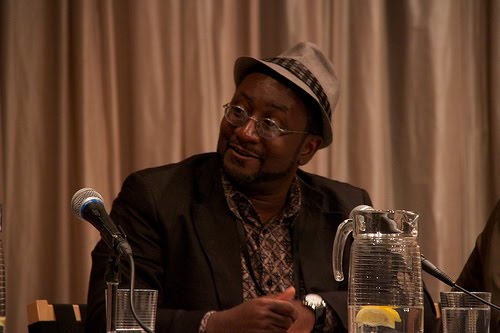Q: I took an honors creative writing class last year and I have read lots of books on writing, but what do they mean by write what you know? They all say that but I don't really understand. My English teacher gave me some good feedback but I'd like to hear what you think.
A: Yes, we always say that--write what you know.
Write what you know, but what do you know? You are still young, a high school student, right?
Well, let's try to understand it this way--write what you don't know . . . . Now think about that for a while. Think of all the things you don't know--how interesting would those things be to write about? How difficult? How much research would you have to do? How interesting would it be to read? Write about nuclear physics, for example, something that neither you (I presume) nor I know very much about.
But you do know what it means to be you (among other things). So now let's go back to that nuclear physics assignment. What if a kid like you, say, found out that his new stepfather was a nuclear physicist . . . after a little research on nuclear physics, you would find that story a lot more natural for you to write, and a lot more authentic feeling for the reader to read.
The best stories are always in one way or another about human truths--and you, because of who you are, know the truth about being a teen--or maybe you know the truth about getting a new stepfather that is out of your league--it is that truth that will make the story worthy of reading--even though it is, for the most part, a complete fabrication.
"Writers have to know how to tell the truth before they know how to tell a lie."
--some guy whose name I don't recall
"Fiction is the lie that tells the truth."
--John Dufresne
"Authenticity comes from personal truth. Speak your personal truth and you have found your voice as a writer."
--Some guy named Preston L. Allen
Now don't confuse "write what you know" with "limit yourself to writing from your limited, peronal vantage point." Study. Research. Learn things. Engage the world. Live life. Study people. Learn people. Then tell the truth disguised as a lie.
I often tell people that BOUNCE, my novel written from the point of view of a black hispanic female who is still in love with an abusive ex-husband, is my most autobiographical novel. And it is. Cindique is me, but so is her lover Roderick Redd . . . I will not explain further.
At a reading once, a woman asked me, "How can you presume to write from the point of view of a woman?"
My answer was a challnege, something like: "Because no one knows THIS woman better than me, not even another woman. In other words, you may know women, but I know Cindique. I also know my mother--who do you think could write more effectively about her, you or me? Writers must learn to write the personal truth of all of the characters that they create. Writers can't be afraid to write out of their sex, or out of their race and ethnicity, if that is where the personal truth leads them."
Read these two interesting novels by writers writing out of their sex: MEMOIRS OF A GEISHA (written by a man); Damage (written by a woman).
As a CRW teacher, I have noticed a couple things about young/beginning writers.
Thing 1) They tend to write a great deal of science fiction and fantasy stories and stories involving dreams or dream sequences. I think that the reason for this is that, when we are young and our knowledge of human nature is till limited, we write such fabulist fiction so that no one can point a finger at us and say, "You don't know what you're talking about." If they point their finger thus in criticism, we can simply answer, "Yeah, but I made it up, so anything can happen. It's not real. It's science fiction." (As though good science fiction or fantasy is any less real to the reader than any other genre of writing.)
Thing 2) The best young/beginning writers tend to be those who have suffered a great deal of pain and thus have a personal well of painful truth to pull from. Thus, some of the best writings we find in CRW classes is from students writing about abuse, rape, poverty, homelessness, and the consequences of any number of bad choices they have made.
I had a friend in grad school I hadn't heard from in a while. When I did, I said to him, "Hey man, are you still writing? Are you getting anything published?"
He said, "No. After I graduated, I married a beautiful woman and we had three great kids. My life improved. I made up with my horrible father. I'm not sad anymore. I am happy now. I guess now I have nothing to write about."
I guess.
Here's something else to ponder: Although there are many exceptions, most writers write their best stuff AFTER the age of forty,
(After they have lived life a bit?
Hmmmmmm.
Thanks,
Preston

No comments:
Post a Comment